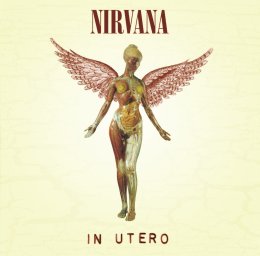
![]()
This post is in partnership with Consequence of Sound, an online music publication devoted to the ever growing and always thriving worldwide music scene.
Once more into the time machine, my dear music fanatics, for we have yet another reissue to unpack and pore over. This one, like so many others, is chockfull of new liner notes, demos, B-sides, and even live material from the album’s era, enough to push über-fans to grind their teeth with anticipation. This particular anniversary reissue is for the disciples of Kurt Cobain, and it comes in the form of In Utero. Yes, Nirvana’s final studio album just turned 20 years old. If the number of years between then and now doesn’t blow your mind, how about the fact that some people will read this review that weren’t even born when In Utero was released on September 13, 1993? Not enough? Some of those same people have had children of their own.
Looking back on In Utero decades later reminds us that, while many remember it first-and-foremost as the last Nirvana album, there is much more to the record than that. Try not to listen to the album as a farewell or as the final work of a songwriter gone too soon. This wasn’t the mindset during the recording (as far as we know). This was simply the third album of a discography with no rapidly approaching end date (as far as we knew). Listen to it as the third record, and nothing more. Listen to how Nirvana responded to incredible commercial and critical success while never losing its sense of purpose. The album it followed, Nevermind, is an undeniable cultural touchstone that launched its specific brand of “alternative music” into the mainstream. Instead of moving forward by attempting to recreate what could never be recreated for their third LP, Nirvana dug in its heels before darting off in an opposite direction.
For production, the band turned to Steve Albini, who is anything but a “yes man.” Compared to songs on Nevermind, “Serve the Servants” and “tourette’s” sound unmixed and unfinished, but not as a detriment. These songs and others on In Utero sound completely fresh and unaffected, and end up creating a much rougher and stripped-down result. It’s been publicized in years since that Albini and the band had their differences post-recording. Cobain and co. even brought in producer Scott Litt, who was enjoying a bout of success producing R.E.M., to work over “All Apologies” and “Heart-Shaped Box”. Regardless of who recorded what song when, what came out of those sessions was something that stands out 20 years later. The lyrics still bite and dare (how many radio hits feature desires to eat cancer along with desired death via umbilical cord?), without neglecting quiet contemplation (“Dumb”, “Pennyroyal Tea”). Describing music as “raw” gets tossed about habitually in this day and age, but that remains the best way to describe In Utero’s sound.
(PHOTOS: Personal Snapshots in the Unmistakable ’90s)
The 2013 remix is a bit of a wash, if only because the album already sounded great. Audiophiles still complain about the mixing of Nevermind (which would see some songs remixed in its own deluxe edition back in 2011), but why mess about with In Utero? Only the truest of the true-eared will notice any significant changes to warrant such an inclusion, but other bonus material fares better. For instance, it’s interesting to hear Albini’s original mixes of “Heart-Shaped Box” and “All Apologies”, the former with much more echo on its guitar freak-out and the latter with its strings buried deeper in the mix for most of its runtime. The album’s demos, which are mostly instrumental, display a tight unit getting ready for official recordings, and include a less-menacing and more Kinks-ish “Very Ape”, as well as B-side “Marigold”, where we hear young Dave Grohl calling someone a bastard under his breath before beginning his vocal take. The gem to take away from the demos is the jangly “All Apologies”, sans strings. I’m a sucker for unearthed demos, if only to see what changes and what stays the same from the word “go.” Live and Loud ‘93 features a complete concert that aired abridged on MTV shortly after In Utero’s release (Remember the life-size angels of the album sleeve on the stage?). Simply put, it joins the ranks of Unplugged, Muddy Banks, and Live at Reading as must-haves. Every album is represented, as well as a full-band version of “The Man Who Sold the World” and the real coup, “Endless, Nameless”, secret no more.
Can you still listen to the music without attaching it to what followed? If you can, open up this toy box and sift through the memories, unearth gems, and listen to Nirvana live all over again. Try to simply enjoy it as it was meant to be enjoyed. Playing armchair psychologist with Nirvana fans always stirs up that detective in us who claims to have deduced the whys and hows of what happened nearly 20 years ago. However, once we remove the pipe from our mouth and the deerstalker cap from our head, we realize we don’t know much at all, and all we have is the music. “All in all is all we are.”
Essential Tracks: “Heart-Shaped Box”, “Dumb”, “Very Ape”, and “All Apologies”
More from Consequence of Sound: Andrew W.K. Is Publishing a Book. On Partying.
More from Consequence of Sound: Five Reasons 31 Elton John Albums Aren’t Enough
